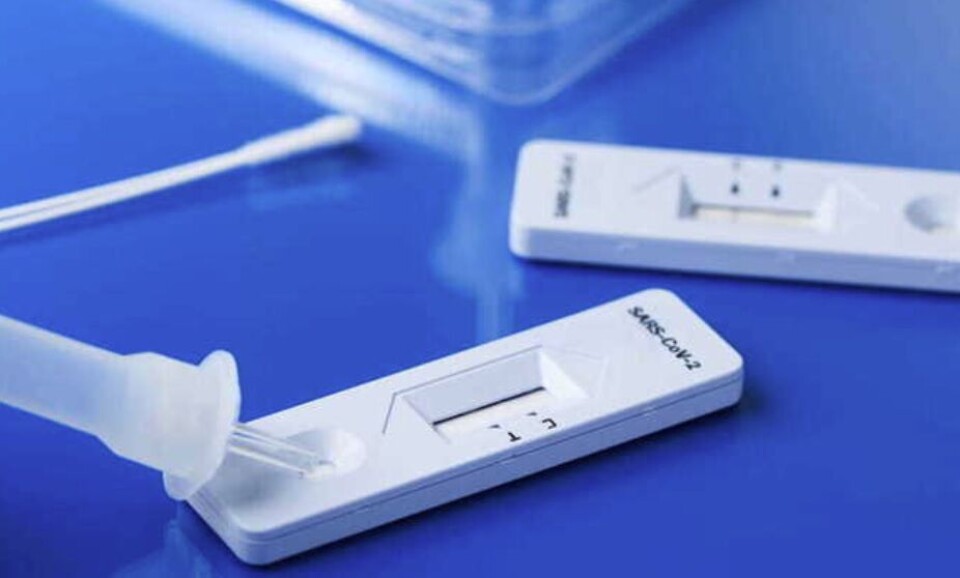-
Alps avalanche risk remains high and 1,000 homes without power after heavy snow
Rail and road traffic disrupted but confinement order lifted for residents of Tignes in Savoie
-
Flights to and from France not expected to be affected by Gatwick Easter strike
Travellers are still advised to check their flight details this weekend
-
Residents ordered to stay home due to high risk of avalanche in French Alps
One person has been injured in an avalanche in Val Thorens, while thousands of homes are without power
Self-testing Covid kits on sale in France: What you need to know
The kits are now in pharmacies and are to be used by asymptomatic people aged 15 and over. Any positive result must be confirmed by a PCR test

At-home Covid self-testing kits (“autotests” in French) are due to go on sale in pharmacies today, Monday April 12.
Self-testing kits need-to-know:
- For sale in pharmacies (not yet in supermarkets; online sales are banned)
- Only to be used by people aged 15 and over without symptoms
- Priced at €6 each maximum, reducing to €5.20 from May 15
- Not reimbursed except in the case of some vulnerable people or carers of vulnerable people
- Any positive result must immediately be confirmed with a RT-PCR test
- Anyone with a positive result must immediately self-isolate and inform their recent contacts
People with symptoms must get a proper PCR test and not use the self-testing kit.
The main goal of self-testing kits is to encourage people without symptoms to test themselves more frequently, in a bid to pick up people who might spread the virus without knowing.
Health Minister Olivier Véran said: “[More and more] pharmacies will be stocked up throughout the week.”
Gilles Bonnefond, president of pharmacist union l'Union des syndicats de pharmaciens d'officine (USPO) said yesterday that the introduction of the self-testing kits had been slower than hoped.
He said: “We will not be ready at 08:00 on Monday [but we will be ready later in the day]. We had hoped to have the information [we needed] on prices and sales conditions in the Journal officiel this morning [on Sunday] but we didn’t.
“We also wanted to see the list of tests that are recognised as reliable by [medicines authority] ANSM. There are six today, including two French ones; but many manufacturers have been offering us tests that have not yet been recognised.
“Pharmacists are careful, they don’t want to sell tests that are not reliable.”
All tests sold in pharmacies from today have been recognised as reliable by the ANSM.
The six brands currently authorised for sale are:
- AAZ
- BioSynex
- Parnassia
- Siemens
- Swiss Point of Care
- JSE
More brands are set to enter the market in the next few weeks and months.
The tests are also set to be used in schools, collèges and lycées, with the goal to offer “two tests per week per pupil or student, and staff”, the health ministry said.
People are also encouraged to do a self-test before meeting friends and family, for example, to ensure they are virus-free.
Yet, the government warns that physical distancing must still be practised even among those who have carried out a test.
How to do an at-home self-test properly
At-home testing kits have a tube, a nasal swab (shorter than the PCR swab), a reactive solution, and a plastic tray that shows the result.
Some kits have a QR code printed on the pack, allowing users to access a video on how to use them.
Overall, the method is as follows:
- Insert the swab 3-4 centimetres into one nostril (but do not push too hard) and roll it around five times
- Then insert the swab into the tube, and drop in some reactive solution
- Swill the swab around in the solution inside the tube, rolling at least six times
- Then, put 2-3 drops from the tube into the plastic tester
- One line will show up to indicate the test has worked
- If the result is positive, a second line will show up within 15-20 minutes
If it is positive, it must be followed up with a PCR nasal swab test as soon as possible.
Video: BioSynex / YouTube (This video is from BioSynex and is presented as an example only. Use the instructions in your kit to ensure a reliable result for the brand you have.)
Self-testing kits recognised by ANSM all have a reliability rate of 50-60% for asymptomatic people, with some claiming reliability up to 80%.
Will they be available in supermarkets as well as pharmacies?
The kits are not yet available in supermarkets, despite some brands - including Carrefour - having already built up a stock of supplies pending a decision from the authorities.
It is not clear if or when self-testing kits might be available in supermarkets. Mr Veran told Le Parisien: “The law does not allow supermarkets to sell medical equipment. Self-testing kits come under that.”
And yet, there are some exceptions, including pregnancy tests and ovulation kits, which have been authorised for supermarket sale in France since 2014.
Professor Jérôme Salomon, director general for health, has also previously said that he is in favour of making access to the test as “easy” as possible, and would in theory like to see them available in both pharmacies and supermarkets.
Related stories
Nasal Covid tests not without health risks says French medical academy
Explained: How to use home Covid tests on sale in France
























